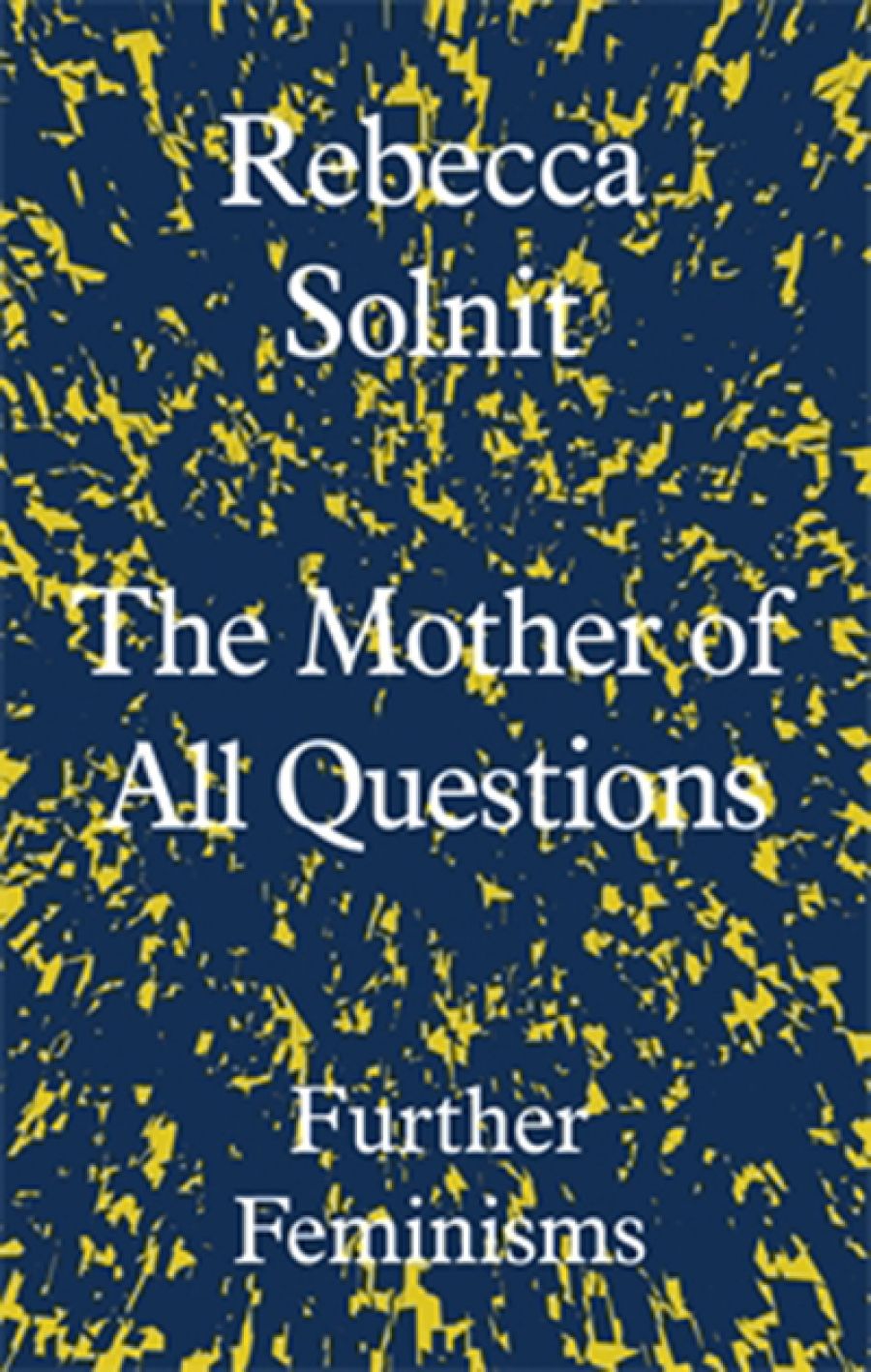
- Free Article: No
- Contents Category: Essay Collection
- Custom Article Title: Johanna Leggatt reviews 'The Mother of all Questions: Further feminisms' by Rebecca Solnit
- Review Article: Yes
- Online Only: No
- Custom Highlight Text:
So much has been written about male–female power dynamics, Trump’s grotesqueries, the public outing of protected abusers, and the growing chorus of women speaking out about sexual harassment that it’s hard to believe there could be anything new to add. Yet Rebecca Solnit, author of celebrated essays ...
- Book 1 Title: The Mother of all Questions
- Book 1 Subtitle: Further feminisms
- Book 1 Biblio: Granta Books, $24.99 hb, 176 pp, 9781783783557
In her introduction to this collection, Solnit makes it clear that hers is an anthology for everyone – men, women, children, and those who are ‘challenging the binaries and boundaries of gender’. This expansiveness and generosity of spirit is in stark contrast to Jessa Crispin’s clarion call Why I Am Not a Feminist (2017). While both works call for revolution, a complete rethinking of gender relations, Crispin is chiefly a flame-thrower and a compiler of grievances. Solnit’s approach is to point out the absurdity of treating women like second-class citizens, while conveying hope that genuine change will blow through, bringing as many people with it as possible.
Silence and women’s untold stories preoccupy much of Solnit’s writing. She draws a compelling distinction between silence that is imposed and the quiet that is sought, arguing that many women possess a vault of unspoken shame that is distinct from the luxury of deliberate quietude. Part of women’s liberation, therefore, is the telling of stories that have thus far been hidden. Having a voice is fundamental to human rights, Solnit says, and the fight for women’s liberation is essentially expressed as the en-masse breaking of silence.
The Mother of all Questions was released a little more than a month before the allegations against movie mogul Harvey Weinstein broke. Although he isn’t mentioned in the collection, the spectre of Weinstein and the gross abuse of power he represents are everywhere. In ‘A Short History of Silence’, Solnit references the exposure of BBC entertainer Jimmy Savile and US comedian Bill Cosby, and highlights the way a hotel maid was able to launch the beginning of the end of IMF chief Dominique Strauss-Kahn. These men wielded considerable power before the dams broke and the stories were told. A few months, however, is a long time in the world of hashtag movements and gender politics, and at times Solnit’s cultural references sound out of date. Some of the men Solnit praises have become fallen stars in the short time between writing and publication. She points to the feminist credentials of comedian Aziz Ansari, but in recent months an anonymous woman has accused Ansari of sexual misconduct. Similarly, Louis C.K. is described as one of a number of recent ‘feminist stand-up comics’; in November 2017 he admitted to sexual misconduct against several women. Nevertheless, such a fast-moving cultural movement is bound to make a few abrupt turns and feature some surprise revelations, and this does not diminish the quality of Solnit’s writing nor blunt the sharpness of her arguments.
Solnit’s problem lies less with men and more with structural dynamics. Indeed, she is sensitive to the way patriarchy imposes a rigid masculinity on men by demanding a kind of emotional castration from an early age. Solnit is at her best when detailing the way masculinity is often a prison, cutting men off from feeling or vulnerability and denying them psychological wholeness. Men and women, after all, have much to gain from a feminism that seeks to liberate both genders from restrictive roles, but men learn quickly in life, Solnit argues, that an emotional depth and richness is the trade-off for power. ‘Masculinity is a great renunciation’, is how Solnit puts it, and one that requires the realm of emotions to be outsourced to women. As a result, we become skilled as adults at protecting ourselves against vulnerability, with ‘people meeting as caricatures of human beings, offering their silence to each other, their ability to avoid connection’.

Perhaps Solnit’s most personal essay is the titular ‘The Mother of All Questions’, a perceptive take on the way women are judged (often harshly) for their life choices, including whether or not to have children. Solnit is often asked why she hasn’t become a mother, and many years of fencing with this question has sharpened her understanding of the imputations behind it and the best response to those asking it. ‘There is no good answer to how to be a woman; the art may instead lie in how we refuse the question,’ she writes. Solnit declares that the best response to such closed questions on women’s life choices, those that are more accusatory than curious, is to respond with an open question as to why the person is asking it. Why, she wonders, are we given a one-size-fits-all model of happiness and success when those conventional formulas, such as marriage and babies, can make prisoners of many people? Solnit puts it most elegantly: ‘We speak as though there is one good plot with one happy outcome, while the myriad forms a life can take flower – and wither – all around us.


Comments powered by CComment